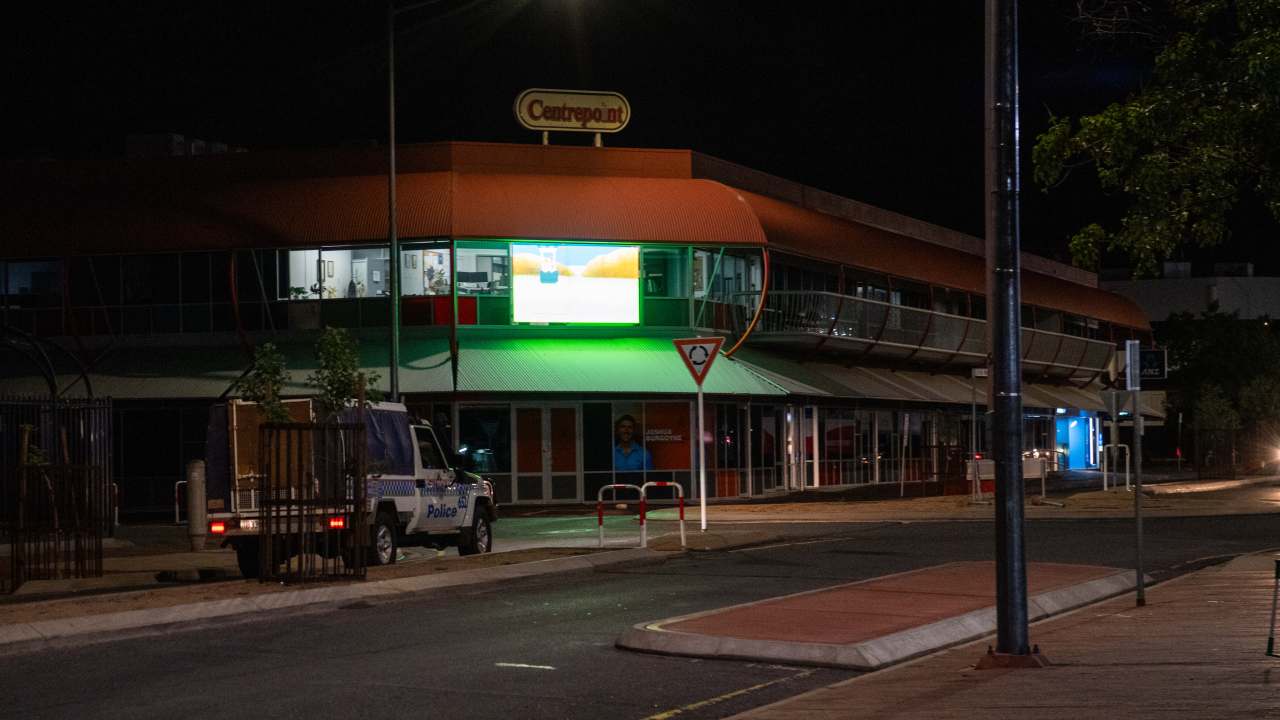The father and husband of two Northern Territory Police officers who were attacked while off duty in Alice Springs says the government must “take the handcuffs off the police” if it wants to get crime under control.
The NT government announced the imposition of a snap three-day curfew on Monday, with Police Commissioner Michael Murphy revealing anyone entering a “declared area” in central Alice would be “engaged by police”.
The curfew comes after four off-duty police officers were attacked by a gang of about 20 males, some of whom were youths.
The three female officers were walking along the Stott Terrace bridge at about 2:15 am on Sunday morning when they were allegedly surrounded and violently assaulted.
Two of the officers – a mother and her daughter who had only just graduated the police academy – were taken to hospital after the incident, where they were treated for wounds sustained in the attack.
SkyNews.com.au spoke to the husband and father of the two off-duty officers, who said the incident was further evidence Alice Springs was “out of control”, describing the outback city as a “horrid war zone”.
The Northern Territory man, whose first name is Chris, said the imposition of a curfew was a “good start” but it was unlikely to make much difference.
“I’m all in favour of the police being able to maintain law and order. If the powers that be believe a curfew is a good way to go then at least that’s a good start,” he said
“(But) those who choose to disobey the law are going to whether there is a curfew or not.”
Chris – who served 11 years as a police officer in Queensland – said the only way the NT government would be able to get on top of the crime crisis “crippling Alice Springs” was by empowering authorities to deal with youth offenders.
“It really is time that we take the handcuffs off the police and put them on the offenders,” he said.
The former Queensland Police sergeant and field training officer said NT officers were “hamstrung” and not properly trained to deal with juveniles.
“They’re hamstrung by legislation; they’re hamstrung with the results in court; (and) there’s not enough facilities to house offenders,” Chris said.
“And the other thing is that for whatever reason they choose not to train their police on how to deal with juveniles.
“I’ve spoken to police prosecutors, I’ve spoken to operational police in Alice Springs ad nauseam to gauge their understanding of juvenile offenders, and I really can’t get a straight answer on why they’re not able to deal with the offenders. I know that they are certainly not trained in that.”
The ex-police officer said the Territory government needed to hold a “serious review” into the juvenile justice system, covering the powers police have, and the number of correctional facilities.
“It’s very, very lacking in the Northern Territory… in the area of juvenile justice. The Police are just not empowered to appropriately deal with juveniles,” Chris said.
Chris said at the core of the problem was the way the principle of Doli Incapax has been applied in the NT – a legal principle that translates to “incapable of evil”, which governs whether juvenile offenders can be held criminally responsible.
He said in Queensland there was a “robust juvenile justice act” which allowed police to rebut Doli Incapax by showing the offender knew what they were doing was wrong.
“If police believe a juvenile has the requisite capacity to know that they have committed an offence then there are very clear guidelines allowing police and empowering police to deal with those juvenile offenders,” the ex police officer said.
“We do that in Queensland by simply asking some very simple questions… to determine if they knew what they were doing wrong.
“(Such as) if a police officer was standing right next to you, would you have done that? If the answer is ‘No’ then you know that you’re on your way to determine that the child has the requisite capacity to know that what they were doing is wrong.”
However, Chris said in the NT, the principle of Doli Incapax was “basically a blanket law” in practice.
“What it has created is a catch-and-release policy with the Police and Juvenile offenders. They literally catch them, determine their age, and drop them home,” he said.
“There’s no punishment at all. And unfortunately, those offences go unaccounted for.
The ex-police officer said he knew of situations in the NT where older teens would bring younger kids to help rob houses, getting them to crawl through dog doors or bathroom windows and let the older offenders in.
“When police turn up – which they often do, because they have an excellent response in Alice… the older kids bolt, leaving the younger kids. and the younger kids get taken home. It’s a really, really sad and ineffective cycle,” he said.
The father and husband of the two attacked officers said the only way to end this cycle was for the NT government to reform the Youth Justice Act in a way which empowered police. But he said this was unlikely to occur.
“The NT government needs to empower police to rebut the Doli incapax exculpation under the criminal and allow the police to actually use a robust juvenile Justice Act to deal with juvenile offenders,” the ex-police officer said.
“There’s a couple of reasons why I personally believe this isn’t happening. One is because the Northern Territory government does not have the facilities to deal with juvenile offenders.
“The second is it’s political suicide for any government to start introducing juvenile offenders into their stats because crime stats will go through the roof – we’re talking about the majority of offences in Alice Springs being committed by juveniles, next to domestic violence.
“So there’s no political party that’s going to want a significant increase in crime on their record.”

